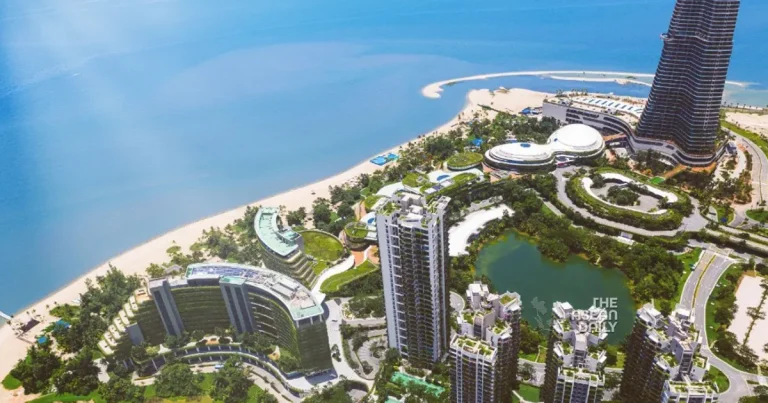31-8-2023 (SINGAPORE) Malaysian Prime Minister Anwar Ibrahim recently announced plans to transform Johor’s embattled Forest City development into a special financial zone (SFZ). While industry leaders believe this could boost Singapore-Malaysia business cooperation, they caution that multiple obstacles must be overcome for the zone to succeed as envisioned.
On the one hand, an SFZ in Forest City may attract Singapore companies seeking lower operating costs and benefit Malaysia through increased partnerships and knowledge transfer. However, realising these potential gains hinges on securing political backing from both governments and addressing the developer’s shaky finances.
Forest City has seen slow construction and low occupancy rates, leading to doubts over its future viability. Its parent company, China’s Country Garden Holdings, is also on the brink of default. Assurances from Country Garden Malaysia that operations remain “safe and stable” have done little to allay concerns.
“This would be a big step in the right direction,” said Low Kueck Shin, president of the Johor Bahru Chinese Chamber of Commerce and Industry (JBCCI), regarding plans for the financial zone. “But we’re worried it won’t take off due to lack of political will and developer backing.”
Lifeline for Firms in Singapore and Malaysia
Despite doubts over the project, Singapore and Malaysia businesses welcome the SFZ proposal as a potential win-win.
For Singapore companies facing rising costs, the zone may offer an affordable nearby alternative, explained Melvin Tan of the Singapore Manufacturing Federation. With space tight in Singapore, smaller firms in traditional industries struggle to stay afloat.
“Because if they can’t afford to lease land in Singapore, these companies are left with two options: find alternative sites outside Singapore or shut down,” he said.
Malaysian companies could also gain from increased partnerships and knowledge transfer with Singapore firms setting up in the zone, noted JBCCI’s Low. He foresees a “multiplier effect”, with more employment opportunities and economic activity generated locally.
Others suggest the zone may appeal to Malaysians working in Singapore and attract manufacturing, services and tech firms priced out of the city-state. But past initiatives cast doubt on whether Forest City can succeed where previous zones have stumbled.
Fizzle Or Sizzle: The Checkered History Of Economic Zones
Industry players caution that proposed special zones in Malaysia have often underdelivered on promises, like the Eastern Corridor SEZ launched in 2009. Prime Minister Najib Razak then projected 220,000 new jobs by 2020, but little evidence indicates this target was met.
Low claimed the Eastern Corridor zone has not benefited locals or retained foreign investors as hoped. His warning: the Forest City zone requires commitment from both governments, not just developers.
Others note cross-border economic cooperation initiatives like the Sijori Growth Triangle have yielded uneven results over the decades. While beneficial, zones outside Singapore have largely seen lower value-added activities, leaving the city-state still preferred for its business environment.
Caution Over Country Garden’s Finances
Moreover, doubts linger whether Forest City’s owner, the debt-saddled Country Garden, can transform a languishing residential project into a thriving financial hub. The Chinese developer’s financial woes have made global headlines.
Country Garden Malaysia insists its local subsidiaries remain on strong footing. Butopacity around Chinese parent firms leaves outsiders unable to assess any spillover risks, said economist Walter Theseira.
“It is reasonable for investors to be concerned based on public information,” he remarked.
With construction lagging for years, industry players say relying on Country Garden alone is risky. The Malaysian government should step in to provide infrastructure and amenities if Forest City is to attract investors, they argue.
Others point out pivoting from housing mainland Chinese buyers to a financial services hub catering to Singaporean firms won’t be straightforward. Housing and amenities tailored to original target residents may not suit new overseas workers.
“For a new SFZ converted from a residential project, it may not be effective and it remains to be seen if it will be a right investment,” said manufacturing exec Melvin Tan.
The Road Ahead
While Anwar’s plan for a Forest City special financial zone offers tantalising possibilities, stakeholders cite tricky obstacles ahead.
Overcoming negative perceptions, dodgy developer finances, securing government backing, and completely revamping the project’s original scope and infrastructure pose challenges.
Still, if executed successfully, the zone could yet provide a jolt of energy and investment for both Malaysia and Singapore businesses. Johor’s aspirations to be a dynamic economic hub akin to Shenzhen also can’t be dismissed.
But leaders caution the zone is far from guaranteed at this stage. Only time will tell whether Anwar’s proposal proves to be an economic catalyst – or yet another grand plan that never gets off the ground.




